The protein category has been, well, put through the meat grinder for the last three years.
From fire sales of steak and seafood inventory at the start of the pandemic to soaring demand for chicken wings that fueled shortages and a surge in costs to the ups and downs of beef prices, operators have struggled to manage their protein-based menu items. On top of these challenges, the pandemic also coincided with the rapid expansion of plant-based alternatives, a trend that may or may not have staying power.
The tumultuous protein commodities environment hasn’t prevented operators from continuing to innovate with protein dishes, however. Operators also remain committed to plant-based alternatives as that category continues to evolve.
“I actually got more innovative through the pandemic because you had to,” said Chad Rosenthal, chef/owner of The Lucky Well barbecue restaurants in the Philadelphia area and the founder of a pandemic-born concept called Motel Fried Chicken, which he is transitioning to a 100% plant-based concept.
Amid supply shortages and rising prices, Rosenthal said he had to take beef brisket off of his Lucky Well barbecue menu for a total of about a year. He continued to innovate with pop-ups featuring lower-cost proteins that had dependable supply, which was how the original Motel Fried Chicken concept was born.
“Week to week, we had no idea what was going to come in and what wasn't going to come in,” he said, noting that supply chain issues are now “about 70% better” that they were during the past few years.
Rosenthal also continued to innovate with things such as appetizers and sandwiches while maintaining his core barbecue chicken and pork offerings. He had to take beef brisket off the menu for long stretches, he said, because prices were fluctuating so much that he could not keep raising and lowering his menu prices to keep pace.
“It's just a tough time to be in the meat business,” he said.
He noted that protein commodity prices appear to have stabilized, citing reasonable costs for chicken wings going into this year’s Super Bowl, when prices usually increase.
“I think things look good right now,” Rosenthal said. “We're definitely still cautious. We’re not moving things too fast or raising prices or lowering prices. It's still a little up and down, but it's as good as I've seen in a long time.”
Mike Gieseman, VP of culinary and innovation at REGO Restaurant Group, parent of the Taco Del Mar and Quiznos chains, said he takes a long-term view of protein commodity prices and continues to innovate with proteins even as prices increase.
“We do have to factor total food cost of the final entrée to see if it's going to be too expensive for our guests, but there are many ways to deal with that,” he said.
For example, Quiznos debuted a Hickory Smoked Burnt Ends sandwich last year despite high costs for the prime rib used to make it. The chain was able to offer the sandwich at a reasonable price, Gieseman said, by keeping it simple and elegant.
“We just did a very simple build and allowed the protein to be the hero of the sandwich,” he said. “It was just onions, pickles, barbecue sauce and cheddar cheese. That helped keep the cost down on the total sandwich — we let the protein shine, and it did extremely well.”
Committing to plant-based alternatives
Both Rosenthal and Gieseman are among the many operators seeking to capitalize on ongoing consumer interest in plant-based protein alternatives, despite some challenges in the category.
About 25 million consumers eat plant-based foods or beverages occasionally or regularly, according to a recent report from The NPD Group, which also found that about one in five consumers said they want to incorporate more plant-based foods into their diet.
Consumers prefer to source plant-based meat, poultry and seafood analogues from restaurants, as opposed to retail, because they believe they will receive a good-tasting product that offers a healthier alternative to meat, the report said. Pound sales of chicken and fish analogues shipped from broadline foodservice distributors increased by 38% and 5%, respectively, in the 12 months ending December 2022 compared to the previous year, according to NPD.
Sales of dairy and meat alternatives will continue to grow through 2024, NDP said, driven almost entirely by millennials and Gen Z, who choose these products because of their interest in sustainability, animal welfare and better health.
“Plant-based beverages and foods are growing and gaining loyalty,” said Darren Seifer, NPD food and beverage industry analyst. “These products still represent a small share in the categories in which they compete but give consumers and foodservice operators more options to consider.”
Gieseman said the quality of plant-based protein alternatives has improved significantly in the past few years, which led him to recently add a plant-based Spicy Chorizo Hash to the menu at Taco Del Mar. The hash is made with plant-based chorizo, diced potatoes, chopped onion and serrano peppers, with a flavor that Gieseman said fits the taste profile of the chain’s Baja-style menu.
“It’s something I have been looking at for the last four years — finding the right fit to expand our vegan offerings with something that would speak to all the guests,” he said.
The plant-based chorizo, from Basic American Foods, offers the right combination of flavor, texture and other qualities that allow it to be prepared just like real chorizo, Gieseman said. By combining the product with potatoes, onions and peppers, he was able to create an item that has been a hit with customers, he said.
“The trick is to find something that entices people to try it,” he said. “Once you get them to try it, the repeat purchases are simple if it's a good product.”
Gieseman sees flexitarians as a strong and growing target market, as opposed to the finite universe of those who are strictly vegan or vegetarian.
“We're seeing that more people are willing to try something other than meat, at least on occasion,” he said.
Rosenthal saw similar trends in consumer preferences that led him to transition Motel Fried Chicken to a plant-based concept. The menu reflects a lifestyle that Rosenthal himself has long dabbled in.
“I have been cooking meat for a long time, and I love to eat meat,” he said. “And I also go on stints where I eat plant-based.”
The revised Motel Fried Chicken was set to debut by early March as a delivery- and takeout-only location in Philadelphia, with a menu featuring chicken-analog sandwiches and nuggets from Tindle, available in regular and spicy varieties. The spicy versions of the chicken items will feature a dry habanero-based seasoning, and customers will have five plant-based sauces to choose from, as well as a salted, plant-based honey alternative that Rosenthal is enthusiastic about.
“I'm trying to create a plant-based restaurant that you don't have to be vegan to love,” Rosenthal said.
Caribou Coffee, which has enjoyed success with plant-based dairy alternatives such as oat milk, is expanding its menu with other plant-based protein alternatives, said Matthew Reiter, VP of merchandising and product at the café chain.
 Photo: Caribou Coffee is expanding its menu with plant-based alternative proteins, such as with its JUST Egg flatbread.
Photo: Caribou Coffee is expanding its menu with plant-based alternative proteins, such as with its JUST Egg flatbread.
The company introduced the JUST Egg Roasted Tomato & Pesto Flatbread last summer as a limited-time offering, and it was so well-received that Caribou brought it back as a permanent menu item this year, Reiter said.
“We are noticing a shift in our customer base — especially with a younger age group — that has a heavy focus on sustainability when it comes to ingredients in their menu choices,” he said. “Our guests also show us that they want delicious beverages and food items made with ingredients they feel good about, which we continue to see through our menu sales and consumer research.”
This includes increasing demand for plant-based options, he said.
Offering plant-based products also helps support Caribou’s own commitment to more sustainable business practices, Reiter added.
Proprietary plant-based solutions
Robert Ancill, CEO of The Next Idea, a restaurant consulting firm that has worked with plant-based concepts, said some products on the market may have lost their appeal as healthful alternatives because of the number of additives they contain, and the high level of processing involved to make them.
“People have lost a little bit of confidence in some of those products,” he said.
Restaurants should still consider carrying plant-based items, Ancill said, but they should be developing their own plant-based alternatives or working with suppliers that can make products with fewer additives.
“Once the product becomes more natural, people begin to trust it more,” he said. “I do think that market will start to expand again over time because it's an ideal solution for people on specific diets — if they're struggling with weight, if they're struggling with diabetes, if they're struggling with heart conditions.”
Ancill works with Plant Power Fast Food, which has about a dozen locations in California and specializes in proprietary plant-based burgers and other plant-based fare made in a commissary.
“I think that's really been part of their success — you can only get Plant Power food at Plant Power,” he said.
Gieseman of REGO Restaurant Group pointed out that concern for animal welfare and the impact of animal agriculture on the environment are drivers of the plant-based trend, and that concern impacts traditional proteins as well. Flexitarians concerned about how animals are treated or how producing animal-based products can impact the environment might also be more interested in meats that are certified as being humanely or naturally raised.
“We're seeing a lot more of that, absolutely,” he said.




